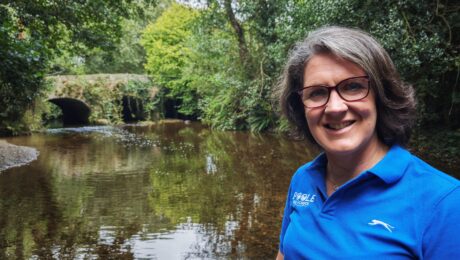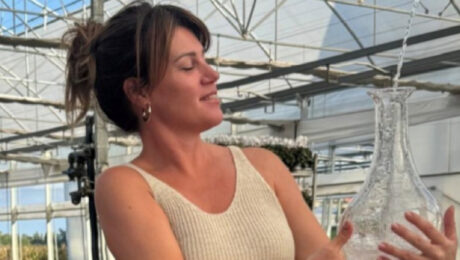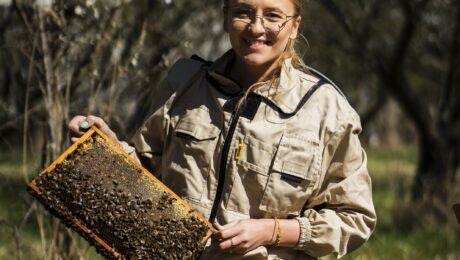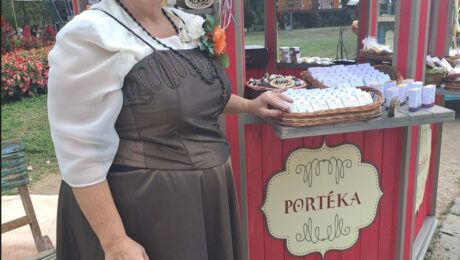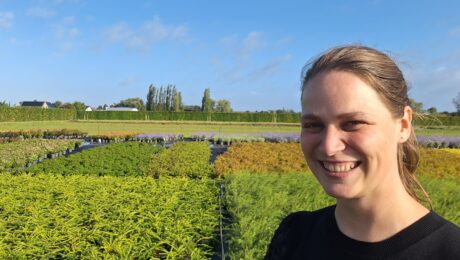Cheryl Poole Ireland – ICOS
Cheryl Poole, Ph.D., is a dairy farmer based near Gorey in County Wexford, Ireland, where she lives with her husband Alan and their three children. The Poole family farm, spanning 103 acres, has been in the family since the early 1700s, making Cheryl and Alan the thirteenth generation to steward the land. Their enterprise centres on a 72-cow high-EBI dairy herd, with a focus on milk solids, herd health, and environmental sustainability. Cheryl’s scientific background, holding a BSc from NUI Galway and a doctorate in Chemistry, underpins her evidence-based approach to farming. Her doctoral research examined the mechanism of action of an anti-cancer drug, equipping her with skills in critical analysis and problem solving that she now applies to agriculture.
Although farming was not always her expected path, family circumstances brought Cheryl and Alan back to the land, where they resolved to demonstrate that an intensive, conventional dairy farm could achieve sustainability across economic, environmental, and social pillars. This conviction was also shaped by personal experience: their eldest son Jacob, who has a severe disability, finds joy and therapy in the River Bann, which runs through their land. Protecting this waterway became both a personal and professional mission.
The farm structure reflects a balance between productive dairy farming and ecological stewardship. More than 20% of the land is dedicated to biodiversity, including wildlife corridors, orchards, and hedgerows. Careful nutrient management ensures high nitrogen efficiency, while slurry storage and roofing minimise waste and water contamination. Rainwater harvesting is used for tasks such as cleaning the parlour, reducing reliance on mains water. The Pooles also engage in national programmes, such as the All-Ireland Pollinator Plan, bat and moth surveys, and regular biodiversity monitoring. Recently, their stretch of the River Bann achieved “Blue Dot” status, recognising it as a high-quality waterbody.
Water-focused innovations form the cornerstone of the Pooles’ sustainability model. These include a rainfall garden, sediment tanks, and a constructed wetland to filter and slow water flow before it enters the river. They have also diverted road drainage away from the river, channelling it through filtration systems on their land. These measures improve water quality, protect aquatic ecosystems, and demonstrate collaboration between farmers, government bodies, and local schools. Their projects not only benefit the farm but also contribute to wider community resilience, with local students using the wetland as a learning site for climate action.
The results of these innovations are far-reaching. Environmentally, nutrient run-off has been reduced, biodiversity has flourished, and the river has been safeguarded. Economically, fertiliser and energy costs have declined, while milk solids and herd performance have been maintained. Socially, Cheryl and Alan’s work fosters community engagement, through school partnerships, public talks, and farm walks. Their farm has attracted national and international recognition, from European Commission officials to researchers from Zambia and Armenia.
Cheryl Poole’s project demonstrates that sustainability in farming can be achieved without sacrificing productivity. By combining her scientific background, personal values, and dedication to her community, she has transformed her family farm into a model of water stewardship and environmental leadership. Her story illustrates how modern innovation, rooted in tradition and care for the land, can secure the future of both farming families and rural communities.
- Published in 2025 Edition
Alessandra Pighin italy – Coldiretti
Alessandra Pighin is a horticultural entrepreneur from Rivignano Teor (Friuli Venezia Giulia), where she works with her husband in their family nursery, Floricoltura Odorico. With roots in farming since childhood, she has helped steer the company towards a model that blends tradition, environmental protection, and innovation. Located in a highly regulated riparian area along the Stella River, the nursery specialises in ornamental plants and species suited to this delicate ecosystem. Alessandra has championed water-efficient cultivation, biodiversity conservation, and reduced-impact production methods. A central achievement is the creation of a large-scale rainwater recovery and recycling system, enabling the company to collect and reuse up to 40,000 m³ of rainwater per year, significantly reducing groundwater use and strengthening resilience against drought. Her commitment to sustainability extends to biological control, inspired early in her career by observing how chemicals affected plant moisture. She now promotes more natural plant protection methods and engages in active knowledge-sharing with schools, local communities, and the University of Udine. In recent years, the business has faced significant challenges, including severe flooding in July 2023 that damaged structures and interrupted operations. Nevertheless, Alessandra views the event as a moment of shared resilience, reinforcing the team’s commitment to rebuilding and further strengthening their sustainable practices. The ongoing recovery underscores the importance of their water-focused innovation and the deep connection between the company, its landscape, and the community it serves
Alessandra’s work shows how a family-run nursery can thrive while protecting a fragile environment, turning innovation and responsibility into long-term resilience.
- Published in 2025 Edition
Lidia Moroń Morawska Poland – KRIR
Lidia Moroń Morawska’s journey into agriculture and beekeeping reflects both a strong family tradition and a deeply personal transformation. Raised within a family that valued farming, she was particularly influenced by her mother, who managed an organic farm, and later by her husband, who ran a conventional apiary of 150 hives. Since 2011, Lidia has been co-managing the apiary with her husband, gaining both technical expertise and a profound understanding of the natural world. However, it was a significant period of health challenges that prompted her to reconsider her professional path. This experience inspired her to pursue a life more closely connected to nature, regeneration, and meaningful work. Motivated by these values, she established her own organic apiary, rooted in ecological principles and a personal commitment to sustainability.
The structure of Lidia’s farm is built upon organic beekeeping practices that prioritise environmental harmony and biodiversity. Unlike conventional methods, her apiary is guided by ecological integrity, ensuring that every stage of production respects natural cycles. The farm focuses on maintaining bee health through natural management techniques, avoiding synthetic treatments, and creating conditions that support strong colonies. Central to her approach is the promotion of diverse forage landscapes, achieved by integrating the apiary into organically managed farmland and surrounding ecosystems. This ensures that bees not only thrive but also contribute to local biodiversity. By cultivating honey and other bee products within these ecological frameworks, she has developed a farming model that is both sustainable and commercially viable.
Lidia’s innovation lies in her transition from conventional beekeeping methods to a fully organic and ecologically aligned system. This shift required extensive learning, adaptation, and investment in environmentally friendly techniques. She has embraced methods that strengthen the natural resilience of bee colonies, thereby reducing dependency on artificial inputs. In addition, her practices enhance pollination services, which in turn benefit the wider agricultural landscape. This holistic approach demonstrates how beekeeping can be both economically productive and ecologically restorative.
The outcomes of her innovation have been significant. By creating an organic apiary that functions as a model of ecological farming, Lidia has demonstrated the value of aligning agricultural production with natural systems. Her bees produce high-quality organic honey and other hive products, which reflect not only a commercial success but also a testament to the health of the environment in which they are produced. Furthermore, her work has had a broader impact on awareness within her community, showcasing the benefits of organic beekeeping and inspiring others to consider sustainable practices. The farm has contributed to biodiversity by encouraging the growth of wild plants and improving pollination for surrounding crops, thereby reinforcing the interdependence between farming and ecological health.
Through her resilience, innovation, and dedication, Lidia Moroń Morawska has created a farm that balances productivity with environmental stewardship. Her story illustrates how personal challenges can be transformed into opportunities for renewal, and how agriculture, when guided by ecological values, can become a source of both livelihood and regeneration.
- Published in 2025 Edition
Monika Zsuzsanna Horváth Hungary – NAK
Monika Zsuzsanna Horváth, born in Oradea in 1971, has led a life defined by resilience, adaptability, and a strong sense of community. After moving to Hungary through marriage, she raised three sons, supported by her second husband, a livestock engineer. With a background in chemical technology and professional experience in the catering industry, Monika decided to redirect her life towards farming and rural development. Together with her husband, she settled in the small village of Szentistvánbaksa, where they began rearing goats. Initially, their focus lay on cheese production, yet Monika soon drew inspiration from her grandmother’s Transylvanian soap-making tradition. Using her own knowledge of chemistry, she transformed this heritage into a modern enterprise. Thus, in 2017, “Gidatitok” was born – a line of high-quality artisan goat milk soaps. What started under a public employment programme grew into a private enterprise, supported by a Budapest family business, and it quickly became a symbol of renewal for the village and its people.
Monika’s farm and manufactory have adopted an innovative approach that links animal husbandry, resource management, and sustainable product development. A key aspect of her model is the replacement of water with goat milk as the primary raw material in soap production. This method not only preserves water but also elevates the value of the final product. By contrast, cheese-making demands extensive water use at multiple stages, making soap a more resource-efficient alternative. Her commitment to sustainability extends further: goats are fed using local green waste from households and municipal services, reducing landfill pressure and improving soil quality through natural fertilisation. The cycle remains firmly rooted in the local ecosystem, as hay harvested from riverside meadows along the Hernád River provides fodder while helping maintain flood defences.
In production, water is used only sparingly for equipment cleaning, with careful measures in place to prevent unnecessary waste. The environmentally conscious ethos also shapes the broader farm activities, which integrate grazing, waste reduction, and natural soil enrichment. These decisions demonstrate Monika’s dedication to protecting local water resources, fostering biodiversity, and minimising ecological impact.
The results of this innovation are manifold and extend beyond environmental benefits. Economically, the enterprise contributes to the local tax base, supports municipal functions, and has invigorated tourism by linking soap-making with the Hernád River’s recreational opportunities. Property values in the village have risen, and new investments have been encouraged. Socially, the initiative is transformative: in a village of just 264 residents, Gidatitok now employs six individuals, offering meaningful work, stability, and renewed confidence to those involved. Many employees have overcome personal difficulties, rebuilt family ties, and regain a sense of purpose through their engagement with the manufactory. The project, once a modest local experiment, has grown into a recognised county treasure, listed in the County Value Registry and celebrated in national media.
Gidatitok exemplifies how a rural community can thrive when local traditions are combined with innovative, sustainable practices. It represents an approach that is both replicable and transferable, inspiring other villages to harness their unique resources. For Monika, the venture embodies more than business success: it is a testament to how collective will, respect for tradition, and a vision for sustainability can bring life back to even the smallest communities.
- Published in 2025 Edition
Sarah Descamps Belgium – Boerenbond
Sarah Descamps, mother of two sons, Léon and Félien, has recently taken over the management of D&V Plant Production, a family-owned nursery specialising in shrubs, herbs, and small fruit plants for garden centres. With a degree in Economics and an early professional experience in another company, Sarah chose to return to her roots by joining her parents’ business. She values the seasonal variety inherent in horticulture and enjoys the combination of administrative responsibilities with the more practical, hands-on elements of her work. This balance of roles provides her with both professional fulfilment and a deeper connection to the rhythm of the natural environment.
Under Sarah’s leadership, the nursery has embraced forward-looking strategies to address one of the most pressing challenges of modern horticulture: water management. Recognising the risks posed by climate change and the increasing scarcity of water, she and her family have undertaken significant investments in technological and infrastructural solutions. Central to this approach is the introduction of a horticultural computer system capable of monitoring and analysing water use in detail. This digital tool enables the nursery to operate with precision, ensuring that every litre of water is used efficiently and sustainably.
A cornerstone of their innovation is the installation of two foliage wells, each with a storage capacity of ten million litres. These exceed legislative requirements and ensure that the nursery is well-prepared for prolonged dry periods. With a total storage capacity of 24 million litres, the business is no longer dependent on external deliveries or vulnerable to drought conditions. Instead, rainwater is carefully collected and reused, creating a closed-loop system. Each summer night, approximately 250,000 litres are used for irrigation, with half of this amount recovered and reintegrated into the cycle. The long-term security provided by this infrastructure not only stabilises production but also demonstrates a practical response to environmental concerns.
The farm’s commitment to sustainability extends beyond water management. Solar panels and battery storage systems power the water pumps, ensuring energy efficiency and reducing reliance on conventional energy sources. Biodiversity is actively promoted within the nursery grounds through the installation of insect hotels and birdhouses, while beneficial insects are used for natural pest control. Together, these practices reflect a philosophy that integrates productivity with ecological responsibility.
The outcomes of Sarah’s innovation are significant on multiple levels. Environmentally, the nursery now operates with reduced pressure on surface and groundwater resources, contributing to the conservation of natural ecosystems. Economically, the stability of water supply secures long-term viability for the business, protecting it from climatic risks and enabling consistent production. Socially, the farm has become a source of inspiration and learning, hosting visits from fellow growers and partners who come to see the integrated water system and digital monitoring tools in action. By sharing knowledge and best practices, Sarah extends the benefits of her approach beyond her own enterprise, helping to guide the wider horticultural community towards more sustainable methods.
Through her vision, Sarah Descamps has transformed her family nursery into a model of resilience and ecological innovation. By uniting tradition with modern technology, she demonstrates how family-run horticultural businesses can thrive in the face of environmental challenges, setting an example that others can follow across the sector.
- Published in 2025 Edition
Ines Theunis. Belgium – Borenbond
Ines Theunis took over running the family farm, which first started with a few Belgian white-blue cattle and now contributes to sustainable and circular production. She produces the basic rations for the cattle herself, applying a short-chain principle to the crops she grows. For example, the sugar beet goes to the sugar factory 10 km away whilst the remaining product (pressed pulp) is used in the cattle rations. She supplements the feed with sustainable concentrates according to the Euroclim principle and is one of the first farmers in Belgium to do so.
Most of the raw materials used are from Belgian and French origin and 100% European, this result in CO2 emissions that are 8 times lower than when using Brazilian or Argentina soya. The Euroclim principle of feed/ food ratio reduces the environmental footprint per litre of milk or kilogram of meat produced without any loss of performance. Ines combines this with her carefully selected breed which has a very high feed conversion rate. She uses a feed based on extruded linseed for fattening the cattle, which has a positive effect on reducing methane emissions from cattle by up to 30% during the fattening phase. Its use also improves feed efficiency and increases the omega 3 fatty acids in the meat. The Belgian white blue breed is an efficient breed of cattle with a low carbon footprint per kilogram of
meat due to high carcass yield and good feed efficiency.
For every kilogram of feed, the Belgian white blue cattle produce more meat compared to other breeds, thus making it a more environmentally friendly breed. Furthermore, the rumen of the cow, which is, on the one hand, a producer of methane, can play just as much of a positive role in the eco-system, and Ines is trying to use it as efficiently as possible. Thanks to its specific rumen, the cattle can convert plant products that are unusable to humans via rumen bacteria into high-quality proteins for humans. With the help of new innovative techniques, animal welfare is optimised. The farm uses digital detection systems to closely monitor calves and ventilation systems. Ines tries to keep up with the trends with her goal being to be one step ahead. She has also established her own meat label called Fines which enables her to show the consumer the story behind the meat.
In addition to the farm, Ines along with her mother and sister have a play farm named RAVOT that allows them to share their passion for agriculture with others. They organise guided tours on the farm showing the cattle and
explaining the workings of the farm. The motto being Discover, Experience & Enjoy.
- Published in 2020 edition
Marija Cafuk. Croatia – HPK
Marija Cafuk has been actively involved in the production of vegetables and is a well-known producer of the Varazdin cabbage, maintaining the tradition of growing and pickling the cabbage. Marija has made major contribution to the Varazdin cabbage protection process at EU level leading to its Protected Designation of Origin status.
Furthermore, she has been involved in the preparation of a book and monography about the Varazdin cabbage as well as several other contributions to books on domestic products to promote the traditions within the rural environment. She is an active participant in the Varazdin County project Experimental – demonstration field which is aimed at demonstrating the numerous ways agrotechnical measure related to reducing carbon emissions, conserving biodiversity, and preserving resilient domestic cultivars adapted to climate change can be implemented.
This has led to improving the knowledge transfer and strengthening the connections between research and practical applications on farms. Through the project she demonstrates how the farm contributes to climate mitigation and reducing greenhouse gases through new tillage techniques and the sustainable management of the farm with the help of energy sources. The project included climate-smart agriculture and an approach that helps guide the activities needed to transform and reorientate agricultural systems to effectively support development and ensure
food production and food supply security. She promotes the importance of soil preservation as an important natural resource, coupled with water, oxygen, and nutrients necessary for plant growth. She also presents the importance of preserving biodiversity and landscape together with importance of preserving domestic varieties and cultivars as
important genetic resources. Through the project, the results of improving competitiveness and higher agricultural productivity in a sustainable way of management were achieved, enabling the effective response to the challenges associated with the growing demand for agricultural products with limited resources and increasingly pronounced climate change. As a model of a successful Farm, Marija receives groups of visitors from different countries as well as from students and children. She has been awarded several times for her contribution to the development of
agriculture in the Varazdin County.
In addition, Marija is the secretary of the Association of Ploughman’s as well as an active member of the Municipal Council Agriculture Committee, County Union of Agricultural Associations and Varazdin Pumpkin Seed Oil
Association.
- Published in 2020 edition
Boglárka Biró. Hungary – NAK
Boglárka Biró has been working as a forest engineer for the last 21 years in one of the largest and leading state-owned forest companies in Hungary. She has applied the practice of sustainable agriculture and forestry management both in her job and on her farm. In 1999, after graduating she founded her own nursery producing forest seedling. Every year, 200-300 thousand seedlings are sold which are used mainly for reforestation and afforestation. Boglárka decided to extend her business activities to crop production and today manages a 36ha farm with diverse activities.
The fields are also home to large red deer population.
Moreover, Boglárka tries to harmonise her land management approach with local conditions and thus diminish the conflict between crop production and wild game management. In order to do so, her crops are divided by grazing fields for the deer, and only protected by temporary fences which can be dismantled after harvest.
This means the habitats of the large herbivores are not reduced. In 2016 she took part in the AES programme, dividing her plots to a maximum of 5ha with pea strips and green fallows. Only bird-friendly reaping is applied,
and a nutrient supply plan is elaborated every year by specialists based on soil samples. She uses biofertilizer and if needed, semi-deep soil loosening is carried out, with no machinery used on wet soil. With an increase of private forestry in Hungary during the early 2000’s, Boglárka also started working as a forest consultant providing advice to new owners who often had no forestry education or experience. In 2005 she received her PhD in forestry, having written her thesis on the false heartwood beech, including an application of non-destructive timber test methods.
With cutting-edge technology the research team managed to be the first in Europe to detect false heartwood using MR (magnetic resonance) technology. She also taught forest ecology and management at the University of Kaposvar for 7 years. Boglárka uses her own experiences and management approach of continuous forestry cover, proving that forest management can be more secured by gradually reducing the area of final cuts and reforesting with mixed forests that are more resistant to damage. Through her management approaches Boglárka has been able to reduce the time of reforestation through a smaller harvest area, well thought-out species choices, application of propagation material of domestic
origin, and carefully chosen nursing operations in the vegetation period. As a result, the loss of quality and quantity in over matured forests can be avoided.
Due to the small-parcel structure and the common efforts with the hunting association, for the first time, even the maize and sunflower remained totally free of wild game damage this year.
- Published in 2020 edition
Special Achievement – Immacolata Migliaccio. Confagricoltura – Italy
The candidate manages a 4ha certified organic farm that consist of mainly greenhouses and is attentive to the theme of circular economy.
The farm specialises in the cultivation of leaf vegetables, legumes, corn and tubers with experimental fields of cultivation of ancient vegetables. The fields are equipped with sensors, irrigation system, agrometeorological station and through a piped music system the crops receive sound wave and ultrasound system between 3 Hz and 5000 Hz.
The digital platform with 4.0 technology connects the various sensor and the Agrometeorological station, with the main purpose of detecting and processing environmental data useful for crops, digitally monitoring the cultivated fields. It has allowed the candidate to intervene with meticulousness on the crops, preventing the attack of harmful insects, and plant diseases as well as being able to irrigate with precision, managing the water resource more efficiently. For example, if the state of humidity is below the expected threshold, the irrigation system is activated during or immediately after the stimulation of the crops with the wire broadcasting of sound waves. This process of bio-stimulation with sound waves facilitates the opening of the stomata of the plants allowing to absorb the
highest percentage of water introduced with lower costs in terms of time and quantity of water poured, moreover it stimulates the development of plants in less time, accelerating growth.
The experience in the field through the set and combination of the methods applied has shown very satisfactory results in terms of a greater yield of product collection with a correlated and significant reduction in company
costs. There was also a marked improvement in plant resistance to plant diseases, as well as a reduction in attacks by harmful insects. Such practices also lead to an optimization of the use of water resources, greatly reducing the waste of water. Through the use of Artificial Intelligence algorithms that store the history of the events and the status information from the fields, it is possible to predict with a high degree of probability, identify and activate
procedures, outputs and any interventions to be performed.
The main goal of all the techniques and used is to improve the quality and resistance of crops to climate change in the area they are grown, as well as reduce attacks by harmful insects and plant diseases.
A renewable energy plant with 20 kW solar panels was also built to limit CO2 emissions, and saving electricity cost.
The candidate has also created an eco-sustainable packaging project ‘SAiCCHETTi-dO’. A shopping bag with 100% recycled fabric. The business is also connected with various local associations and non-profit organizations to carry out targeted training, inclusion, orientation and educational activities through social farming courses aimed at disadvantaged groups of children.
- Published in 2020 edition
Winner – Nazaret Mateos Alvarez. UPA – Spain
The candidate is the manger and owner of her farm and business EntreSetas that is characterised by its circular
economy of proximity which starts with the selection of raw materials and ends with the generated waste being
used as organic fertiliser against Nematoda.
They are the first ecological company of mushroom growing in the Castilla and Leon region and the only one in
Spain with environmentally friendly facilities taking a natural farming approach. The substratum is selected from
their fields in the region, from which they obtain the stalk and cereal that will later be used as a layer for the
mushrooms. The mycelia are selected from the best Spanish seed banks and are always certified to be transgenic
free. The plantation of the species is done by hand, which gives the candidate additional information about the
state of the layers at the time of farming. There is no forced heating or cooling to avoid pollution by the gases in
the products. They do not use automatic watering in order to reduce water waste and promote the quality of their
mushrooms and the irrigation of the mushrooms mainly comes from rainfall. Thanks to the lower temperature at
night, the condensation produced generates water drops on the ceiling of the greenhouse,which creates natural
rain by falling back to the ground. The greenhouses have darkening nets and no artificial lights to promote natural
cycles of mushroom growing and to reduce the environmental impact. Their consumption of energy comes from
the self-sufficiency of their solar panels.
These synergies have also led to collaborations such as supplying mushrooms for Las Fallas and providing workshops
for children on growing and harvesting, as well as to caterers for a Spanish band in Madrid. The candidate often
collaborates with different local institutions. They have collaborated with schools on the environmental education
to students; with associations for retired people, revitalising mycological programmes to get children closer to older
people. Indirectly, they support local employment through their various products relating to mushrooms; local
farmers for raw materials, bakeries and restaurants etc.
The business has a free of plastic policy as well as self-sustainability and zero waste policy. The plastic free waste
generated on the farm is taken to a composting area that is also used by other farmers as organic fertiliser for its
power against Nematoda. Due to this practice, they are in a state of zero waste. They actively try to eradicate the use
of not-necessary plastic and all containers used are all made of paper, cardboard, glass-aluminum and wood.
They have the permission to sell their products abroad, as there are no phytosanitary products or polluting supplies.
They have also obtained permission from the Ministry of Agriculture of the United States to send their mushroom
growing kits to America.
- Published in 2020 edition

